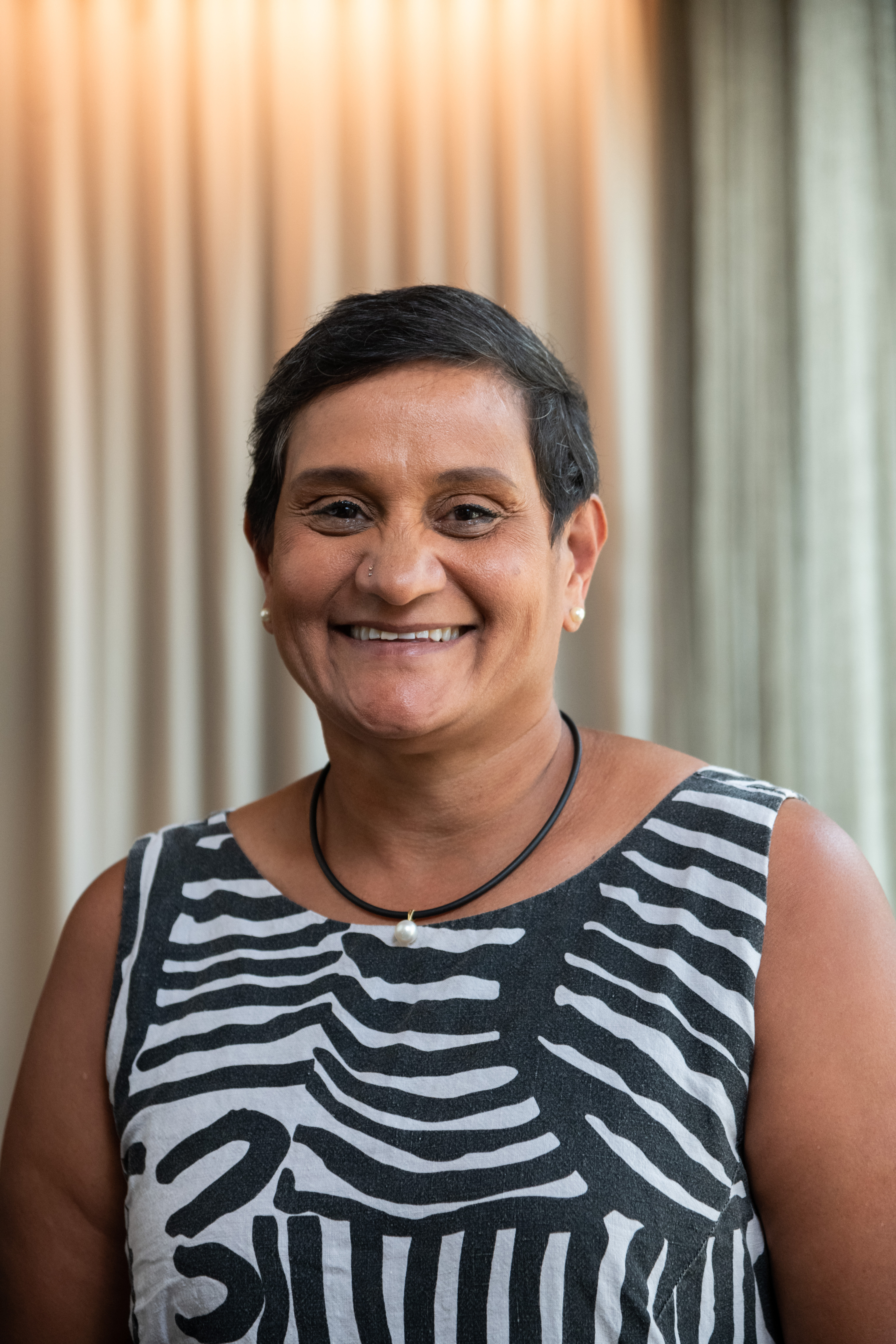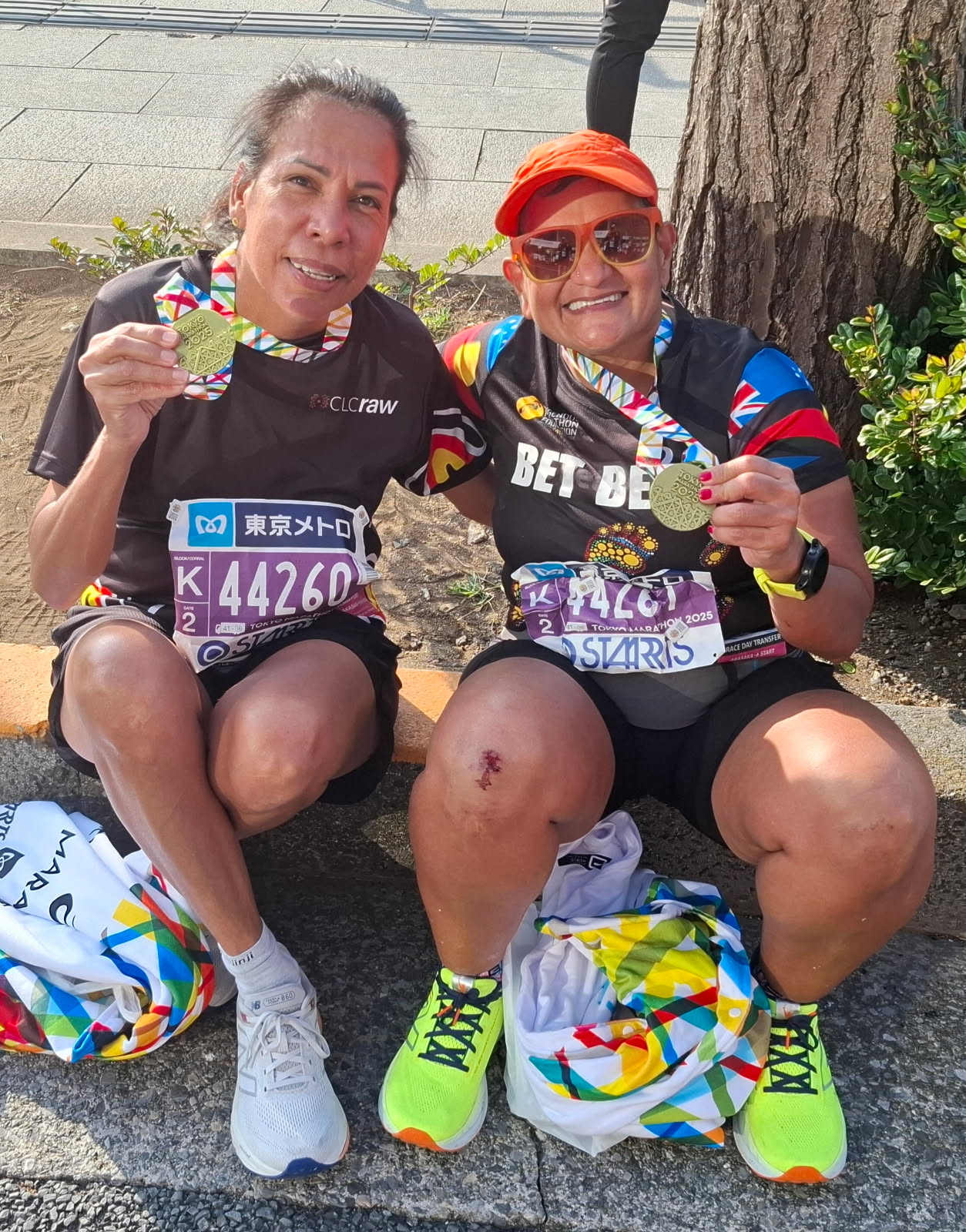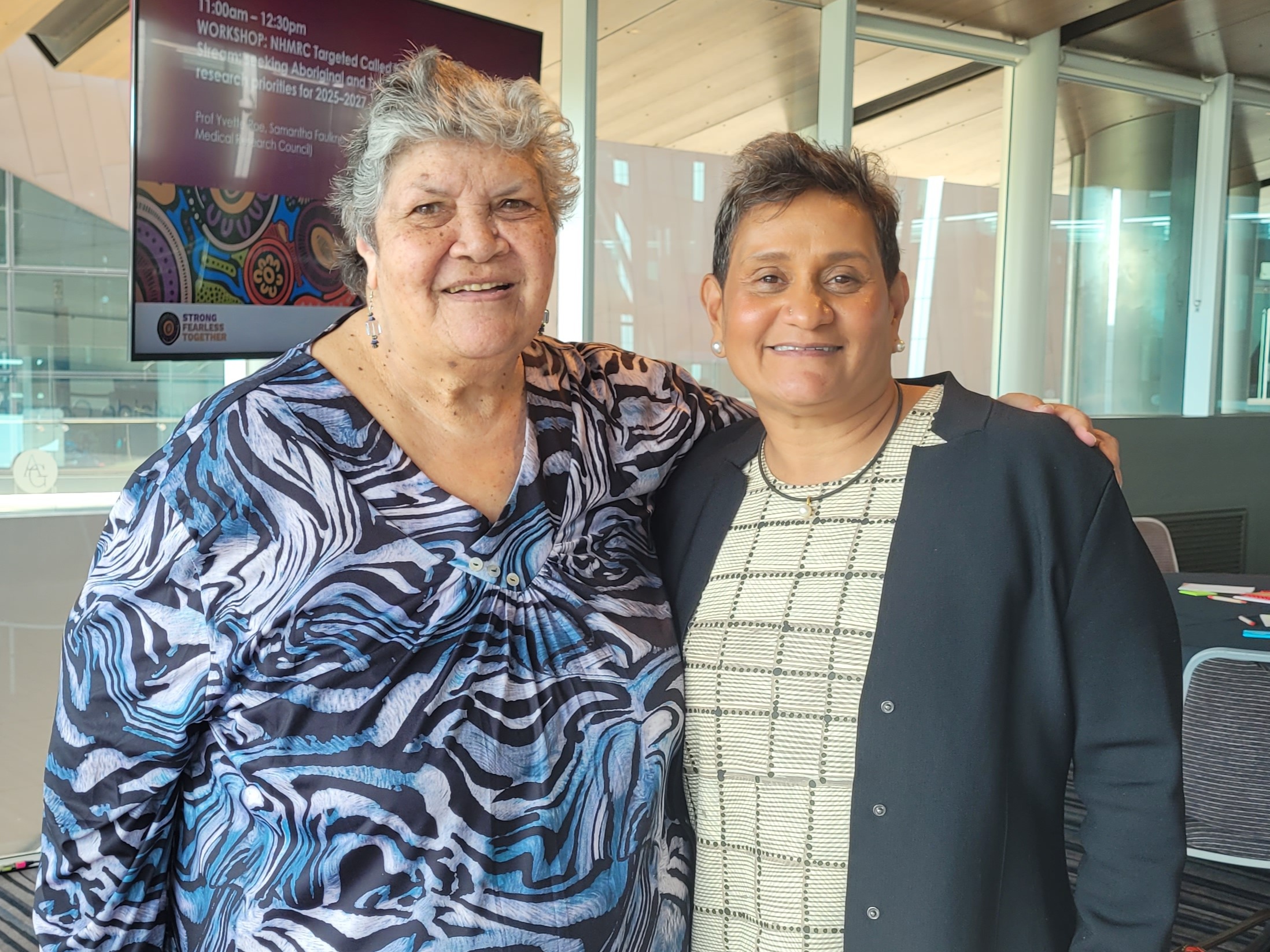Yvette Roe is a proud Njikena Jawuru woman from the West Kimberley and Professor of Indigenous Health at Charles Darwin University. Yvette is also Director of the Molly Wardaguga Research Institute for First Nations Birth Rights. With a career spanning over 35 years in Indigenous health, Yvette has dedicated her life’s work to amplifying Aboriginal and Torres Strait Islander voices in efforts to achieve their aspirations. Here is where she has seen the impact that research can have, driving her motivation to make more change for the generations moving forward.
Yvette was born in Darwin on the sovereign lands of the Larrakia People and describes herself as both a freshwater and saltwater person from her mother’s and father’s sides respectively. Although she now lives in Garramilla (Darwin), home for her is the West Kimberely. She is a proud mother, grandmother, sister (Yvette is daughter number 8 of 11 children), aunty, friend and colleague. While these roles vary professionally and personally, she feels deeply grateful for all opportunities she has had throughout her life.

Also, among the different hats Yvette gets to wear, she is an avid marathon runner, having completed the 44.2 kilometre feat across 6 marathons, multiple 50-kilometre trail running events and one 100 kilometre trail running event so far. While this may be impressive to everyone else, Yvette describes her experience by saying:
‘I don’t win them, however I do finish them.’Professor Yvette Roe
Running is something Yvette feels is critical in maintaining both her physical and mental health. She also considers it as a way for her to connect to Country. Whether she’s running on the beach, the rolling mountains in New Zealand or through the thick frost of a Canberra winter, it's a way that she connects with places. Whereas some people may need coffee in the morning before they can engage with the world, Yvette needs to run before she feels human to take on whatever the day may bring.
Reflecting on her career pathway and how she got to where she currently is, Yvette, without any hesitation, notes it is because of her biggest teacher in life – her mother, who sadly passed away 7 years ago.
‘The person who I am today is because I had a strong black mother who loved me and believed in me. She said, “it’s going to be okay, you’ll do it because I know you can do anything” and this was a gift.’Professor Yvette Roe

Yvette reflects that one of the most important lessons instilled in her and her siblings at a young age was her work ethic. Being told by her mum “I don’t care what you do baby, but you make sure you work hard, and you do it well,” encouraged Yvette to be more curious about the world and more analytical when creating strength-based and community driven solutions to problems.
‘When I look back across my career, that grounding comment from my mother has always been the anchor point that's given me the courage to go forward. Working and living in different places in Australia, I have been fortunate to have been exposed to innovative local Aboriginal people who are passionate and excited about how communities can be, and are, part of the solutions. One of the key things for me is amplifying Aboriginal voices and making spaces around the decision making tables for them.’Professor Yvette Roe
When she was growing up, Yvette never thought she would be the first one in her family to attend university. She didn’t even know anyone who had gone to university and yet one of the key points in her career was going from her small town to attending her first tertiary sociology class of 300 people. Yvette was the only Aboriginal person in the class. It was here she noticed how the broader community related to each other and the theoretical frameworks that shape how communities are formed. These insights were very different from growing up in an extended Aboriginal family in northern Australia. Attending university she became aware of the giants on whose shoulders she, and many other Aboriginal people, stand – on the shoulders of the many Aboriginal and Torres Strait Islander peoples who protested in the streets in the 1960’s and 1970’s for Aboriginal land rights, equal wages and access to education, employment and health services.
After graduating, Yvette then worked for the Aboriginal Community Controlled Sector in Derby Aboriginal Health Service, as well as NACCHO where she learned from the powerful work and conversations of amazing leaders at the frontline such as Dr Naomi Mayers OAM. While she acknowledges her mentors, Professor Arnold ‘Puggy’ Hunter and Dr Carmel Nelson, who created opportunities for her and supported her. However, this was equally met by Yvette’s bravery to step through those doors of opportunity.
‘It's true what they say. If you can't see it, you can't be it. I’ve really been the beneficiary of people investing in, supporting and guiding me. With this support, you grow, you allow yourself to be challenged and step up to those challenges – realising that you have the skills and knowledge that you can offer the community and bring back home.’Professor Yvette Roe

During her doctoral studies at the University of South Australia, Yvette was a proud member of the Deadly Nerds, consisting of other Aboriginal and Torres Strait Islander students completing their PhDs. It was with this cohort of scholars during early 2000 that Yvette was introduced to the NHMRC and its investment strategies aimed at building Aboriginal and Torres Strait Islander research capacity.
Yvette was fortunate enough to be a part of 2 of these capacity building grants, one led by Professor Emeritus Professor Richard ‘Rick’ Spears at James Cook University, and the other led by Professor Robyn McDermott. It was a seminal opportunity for Yvette and her cohort, and she credits this opportunity to over 20 PhD graduates now holding the title of either Associate Professor or Professor.
‘These grants really broke the mould on how accelerating Indigenous research capacity could be done. I would suggest that this is the biggest and most rewarding investment developed by the NHMRC, and I am very grateful because it added so much to my career.’Professor Yvette Roe
Yvette now works in research and health sector reforms targeting how outcomes for Aboriginal and Torres Strait Islander mothers and babies can be and are being improved. While she may not be the clinician catching the babies during labour, her job is to be the truth teller by generating high level evidence about what best practice and quality health care is.
‘We know that we've completed research in genuine partnership with community when it shows that there's been a 38% decrease in preterm birth weight for babies born preterm in southeast Queensland. We’ve also seen the reduction of unnecessary clinical intervention during birth, whether they’re not going to the Neonatal Intensive Care Unit or we’re seeing families being kept together.’Professor Yvette Roe

It is this model of care, developed through meaningful partnerships with the community, that truly makes a difference in giving these babies the best start to life. Conducting research that draws on Indigenous knowledges can help us understand and fix complex problems and this is part of the Yvette’s legacy.
Beyond her academic career, Yvette states unequivocally that her biggest teacher and one of her greatest learnings in life has come from becoming a mother herself to 2 children.
‘Becoming a mother holds you to a different level of accountability. I wanted to ensure my children had exposure to the same number of opportunities I was fortunate enough to have. To live a life of integrity is to actively listen to your children and to enact behaviour that really supports them grow and develop.’Professor Yvette Roe
However, despite these accomplishments across various pockets of her life, Yvette admits she has felt challenged by the ‘imposter syndrome’ and not feeling good enough. She notes that this will be an ongoing challenge for women, especially Aboriginal and Torres Strait Islander women, emerging through the health and medical research sector. Yvette is determined to use her life experience to her advantage, using her ‘pointy elbows’ to make room for herself and recruit other women to take up the space at the table with her.
If you were to ask Yvette how she feels now about this challenge, she would tell you she wants to be a disruptor, change maker, mentor and an active participant. Wholeheartedly, she wants to be that auntie who says, ‘come on, we’ve got this’.
‘I want to be strong enough so the next generation can stand on my shoulders and continue to make positive changes for our people and that means I've got to look after myself. As I start to get into a certain age group, I've got to look after my mental and physical health because I want to be there to see what my granddaughter can achieve - things we may not think possible right now.’Professor Yvette Roe
Establishing the next generation of emerging and early career Aboriginal and Torres Strait Islander researchers is exciting. Yvette is incredibly passionate about encouraging them to be bold in the questions that they’re asking, and the methodologies they use. She advises them to connect with growing networks of committed non-Indigenous allies because we can't do revolutionary change without each other.
‘I get really excited when I talk about mentoring and I think it’s a privilege to be of my age, to have had the life I’ve had, to meet wise and courageous people and to have learnt the lessons I have learned. More importantly, to be able to pass this onto the next generation of researchers.’Professor Yvette Roe
When it comes to life advice, Yvette is quick to tell young women (and men) to practice self-compassion and to be gentle on themselves because they’re not going to get it right all the time, making mistakes will be inevitable and that's ok. Know that you are enough.
‘That being said, Aboriginal peoples have been doing research for over 65,000 years and we continue to carry with us ancestorial knowledges and wisdom, connection to country, love of community and passion to ensure all our communities thrive. The next generation is already linked into an existing songline. Life is too short to have regrets.’Professor Yvette Roe